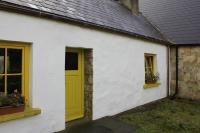Ireland: According to data released by the Economic and Social Research Institute, real estate prices have fallen 40-45% from 2007 peak in Ireland. Recovery has been halted by the high unemployment rate and the reduction in wages. The real estate market may experience another 5-10%-fall before start ...
Real estate prices are falling in Ireland
Ireland: According to data released by the Economic and Social Research Institute, real estate prices have fallen 40-45% from 2007 peak in Ireland. Recovery has been halted by the high unemployment rate and the reduction in wages. The real estate market may experience another 5-10%-fall before starting to recover. The highest drop has regarded the segment of country houses in particular, where prices have fallen by 50%. The supply of properties for sale has also fallen, as owners have decided to hold onto it and wait for the market to recover.
Market recovery may be hampered by the glut of new homes that are being built in Ireland, too. The National Institute for Regional and Spatial Analysis has released a report that explains how reckless planning decisions have made the glut of newly-built dwellings increase in the country.
In the second quarter of 2010, the average price of a residential real estate in Ireland was 144 euros per square foot. In Dublin, a residential property costs 192 euros per square foot. Prices are higher in the capital city, but they have fallen at a steeper rate than in the rest of the country. The number of transactions has also fallen off. Privacy laws in Ireland do not permit home buyers to have access to sales prices and this makes it difficult for them to understand the actual market value of a property.
Ireland attracts overseas investors – most commonly from Germany, Britain and The Netherlands – who are interested in buying real estate properties in the West coast, which boasts enchanting landscapes and excellent recreation facilities. Second-home buyers coming from the USA and Canada, instead, prefer the East coast – County Wicklow is the privileged investment spot and a beloved holiday destination.
Foreign buyers are not subject to any restriction when purchasing a real estate property in Ireland. Home buyers have to pay a stamp duty if the property price is over 125,000 euros and legal costs are comprised between 0.5% and 1% of the property purchase price. The commission of the real estate agent is paid by the seller.
Some good signs of improvement come from the commercial real estate market. Dublin property office market has improved its letting activity, although there are also a number of high-profile office sales which may be concluded shortly. The enhancement of the office market is boosted by the increasing number of overseas pharmaceutical firms and IT companies choosing to establish their headquarters in Ireland. They are attracted by the 12.5% corporation tax rate, by the decline in prime rents and by the ready availability of labour.
Analysts say there has been a reduction in the volume of industrial transactions.
The age of the Irish property market boom seems to be over, but the pricing drop has made the real estate market in Ireland more affordable and more attractive. Wise investors are now looking at Ireland as an advantageous future investment destination, as the ideal place to make a buy-to-let investment – by purchasing a dwelling that will be rented to holidaymakers – The potential income deriving from holidaymaking is indeed still very strong.
Related Insights
-
Real estate prices are falling in Ireland
Real Estate Listings
For sale House, Ireland, Galway, Gort, Wren's Nest, Shanaglish

For sale
House
120 m²
For sale Farm, Ireland, Kerry, Kenmare, Rowandale, Ballygriffin, Kenmare, Co. Kerry, Ireland

For sale
Farm
6890 m²
For sale Villa, Ireland, Wicklow, Valleymount, an dun ard, Ballyknockan

For sale
Villa
300 m²
For sale House, Ireland, Donegal, Meencorwick, Meencorwick, Donegal

For sale
House
140000 m²
For sale House, Ireland, Clare, Flagmount, Flagmount

For sale
House
40.450 m²
For sale Farmhouse, Ireland, Dublin, Myshall, coolnasnaughta

For sale
Farmhouse
278.71 m²
For sale House, Ireland, Cork, West Cork, West Cork

For sale
House
278.71 m²
For sale Hotel, Ireland, Clare, Ballyvaughan, Bishops Quarter

For sale
Hotel
4000 m²


 Free real estate ads
Free real estate ads
